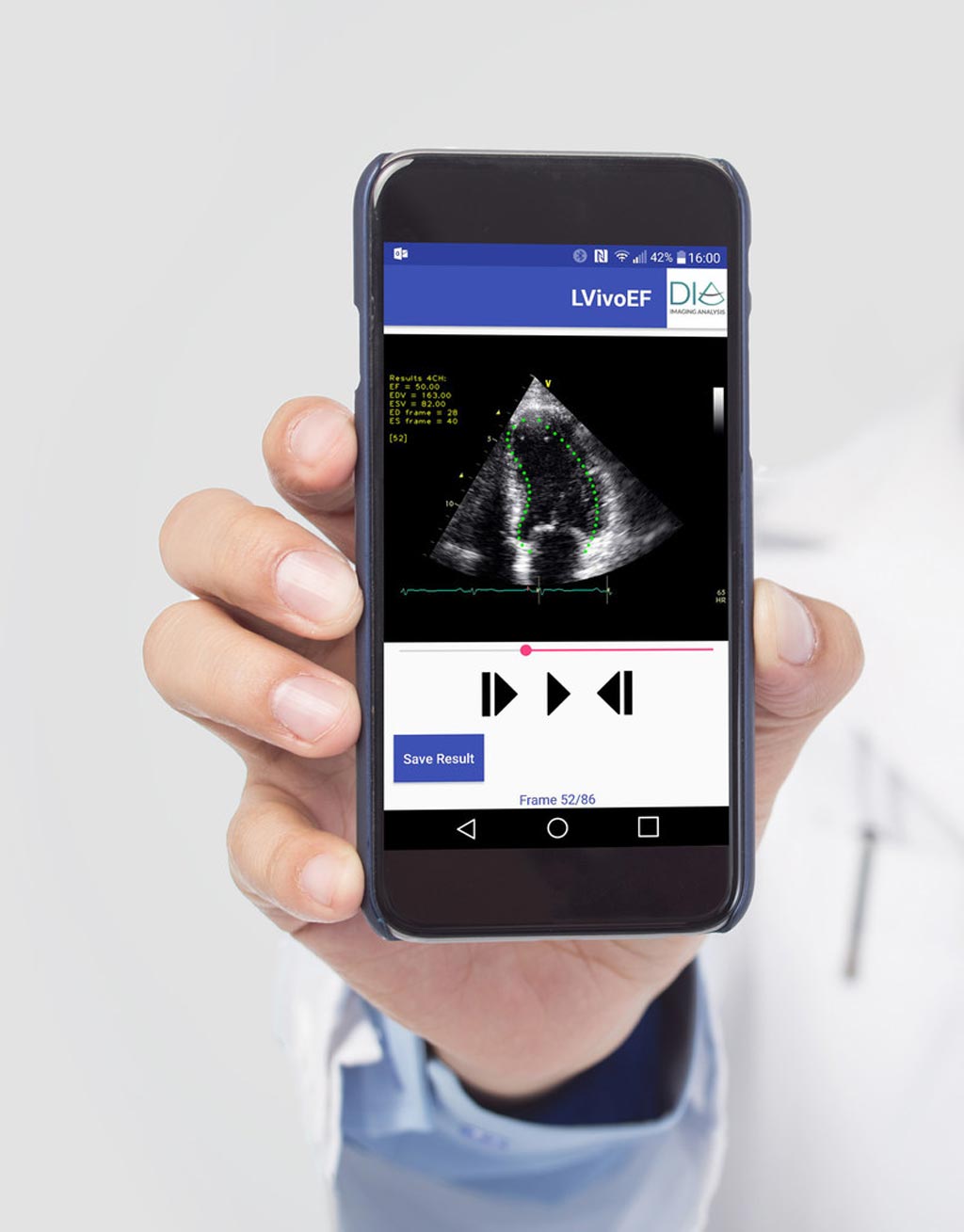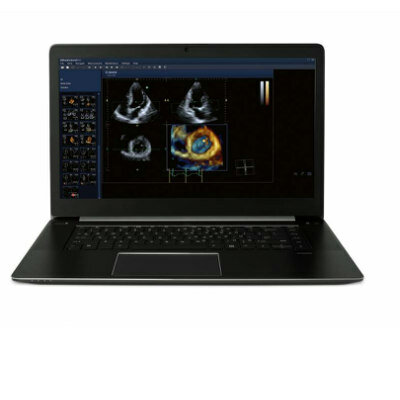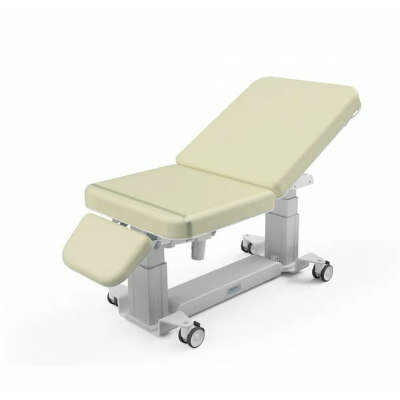GE Healthcare and DiA Imaging Analysis to Develop Machine Learning Algorithms
|
By MedImaging International staff writers Posted on 28 Nov 2017 |

Image: Automated tools for ultrasound analysis on mobile devices (Photo courtesy of DiA).
GE Healthcare (Chicago, IL, USA) has entered into a multi-year, non-exclusive licensing and professional services agreement with DiA Imaging Analysis (Be'er Sheva, Israel), a medical imaging analysis software company, for developing automated imaging analysis technology to work with its ultrasound devices.
DiA provides fully-automated, implementable tools, which allow for quick, objective, and accurate imaging analysis, with an initial focus on echocardiography. The company's FDA and CE cleared cognitive image processing tools are based on advanced pattern recognition and machine learning algorithms that automatically imitate the way the human eye identifies borders and motion, producing accurate and reliable data for the use of physicians.
DiA’s automated imaging analysis technology also provides immediate, accurate, and reproducible imaging interpretation of ultrasound for point of care settings. By utilizing advanced, proprietary pattern recognition and sophisticated machine learning algorithms which can improve monitoring of patient conditions, these tools offer physicians powerful tools to support their decisions.
"We are pleased to partner with DiA Imaging Analysis. GE Healthcare has a long history of bringing innovative solutions to our customers around the world," said Rob Walton, general manager of GE Healthcare Primary & Affordable Care. "These tools would bring new capabilities to ultrasound at the point of care."
"We are excited with this collaboration, and look forward to working with a market leader such as GE Healthcare," said Hila Goldman Aslan, DiA's Chief Executive Officer and Co-Founder. "Our advanced automated tools for point of care echo ultrasound analysis are first to market, and we are planning to soon launch additional automated imaging analysis tools as part of our vision to improve patient care."
"To date, we are the only company that offers automated tools for handheld ultrasound devices and we are proud to partner with GE Healthcare to provide immediate information at the point of care," added Arnon Toussia-Cohen, DiA's Chairman and Vice President of Business Development.
DiA provides fully-automated, implementable tools, which allow for quick, objective, and accurate imaging analysis, with an initial focus on echocardiography. The company's FDA and CE cleared cognitive image processing tools are based on advanced pattern recognition and machine learning algorithms that automatically imitate the way the human eye identifies borders and motion, producing accurate and reliable data for the use of physicians.
DiA’s automated imaging analysis technology also provides immediate, accurate, and reproducible imaging interpretation of ultrasound for point of care settings. By utilizing advanced, proprietary pattern recognition and sophisticated machine learning algorithms which can improve monitoring of patient conditions, these tools offer physicians powerful tools to support their decisions.
"We are pleased to partner with DiA Imaging Analysis. GE Healthcare has a long history of bringing innovative solutions to our customers around the world," said Rob Walton, general manager of GE Healthcare Primary & Affordable Care. "These tools would bring new capabilities to ultrasound at the point of care."
"We are excited with this collaboration, and look forward to working with a market leader such as GE Healthcare," said Hila Goldman Aslan, DiA's Chief Executive Officer and Co-Founder. "Our advanced automated tools for point of care echo ultrasound analysis are first to market, and we are planning to soon launch additional automated imaging analysis tools as part of our vision to improve patient care."
"To date, we are the only company that offers automated tools for handheld ultrasound devices and we are proud to partner with GE Healthcare to provide immediate information at the point of care," added Arnon Toussia-Cohen, DiA's Chairman and Vice President of Business Development.
Latest Industry News News
- Hologic Acquires UK-Based Breast Surgical Guidance Company Endomagnetics Ltd.
- Bayer and Google Partner on New AI Product for Radiologists
- Samsung and Bracco Enter Into New Diagnostic Ultrasound Technology Agreement
- IBA Acquires Radcal to Expand Medical Imaging Quality Assurance Offering
- International Societies Suggest Key Considerations for AI Radiology Tools
- Samsung's X-Ray Devices to Be Powered by Lunit AI Solutions for Advanced Chest Screening
- Canon Medical and Olympus Collaborate on Endoscopic Ultrasound Systems
- GE HealthCare Acquires AI Imaging Analysis Company MIM Software
- First Ever International Criteria Lays Foundation for Improved Diagnostic Imaging of Brain Tumors
- RSNA Unveils 10 Most Cited Radiology Studies of 2023
- RSNA 2023 Technical Exhibits to Offer Innovations in AI, 3D Printing and More
- AI Medical Imaging Products to Increase Five-Fold by 2035, Finds Study
- RSNA 2023 Technical Exhibits to Highlight Latest Medical Imaging Innovations
- AI-Powered Technologies to Aid Interpretation of X-Ray and MRI Images for Improved Disease Diagnosis
- Hologic and Bayer Partner to Improve Mammography Imaging
- Global Fixed and Mobile C-Arms Market Driven by Increasing Surgical Procedures
Channels
Radiography
view channel
Novel Breast Imaging System Proves As Effective As Mammography
Breast cancer remains the most frequently diagnosed cancer among women. It is projected that one in eight women will be diagnosed with breast cancer during her lifetime, and one in 42 women who turn 50... Read more
AI Assistance Improves Breast-Cancer Screening by Reducing False Positives
Radiologists typically detect one case of cancer for every 200 mammograms reviewed. However, these evaluations often result in false positives, leading to unnecessary patient recalls for additional testing,... Read moreMRI
view channel
Low-Cost Whole-Body MRI Device Combined with AI Generates High-Quality Results
Magnetic Resonance Imaging (MRI) has significantly transformed healthcare, providing a noninvasive, radiation-free method for detailed imaging. It is especially promising for the future of medical diagnosis... Read more
World's First Whole-Body Ultra-High Field MRI Officially Comes To Market
The world's first whole-body ultra-high field (UHF) MRI has officially come to market, marking a remarkable advancement in diagnostic radiology. United Imaging (Shanghai, China) has secured clearance from the U.... Read moreUltrasound
view channel.jpg)
Diagnostic System Automatically Analyzes TTE Images to Identify Congenital Heart Disease
Congenital heart disease (CHD) is one of the most prevalent congenital anomalies worldwide, presenting substantial health and financial challenges for affected patients. Early detection and treatment of... Read more
Super-Resolution Imaging Technique Could Improve Evaluation of Cardiac Conditions
The heart depends on efficient blood circulation to pump blood throughout the body, delivering oxygen to tissues and removing carbon dioxide and waste. Yet, when heart vessels are damaged, it can disrupt... Read more
First AI-Powered POC Ultrasound Diagnostic Solution Helps Prioritize Cases Based On Severity
Ultrasound scans are essential for identifying and diagnosing various medical conditions, but often, patients must wait weeks or months for results due to a shortage of qualified medical professionals... Read moreNuclear Medicine
view channel
New PET Biomarker Predicts Success of Immune Checkpoint Blockade Therapy
Immunotherapies, such as immune checkpoint blockade (ICB), have shown promising clinical results in treating melanoma, non-small cell lung cancer, and other tumor types. However, the effectiveness of these... Read moreNew PET Agent Rapidly and Accurately Visualizes Lesions in Clear Cell Renal Cell Carcinoma Patients
Clear cell renal cell cancer (ccRCC) represents 70-80% of renal cell carcinoma cases. While localized disease can be effectively treated with surgery and ablative therapies, one-third of patients either... Read more
New Imaging Technique Monitors Inflammation Disorders without Radiation Exposure
Imaging inflammation using traditional radiological techniques presents significant challenges, including radiation exposure, poor image quality, high costs, and invasive procedures. Now, new contrast... Read more
New SPECT/CT Technique Could Change Imaging Practices and Increase Patient Access
The development of lead-212 (212Pb)-PSMA–based targeted alpha therapy (TAT) is garnering significant interest in treating patients with metastatic castration-resistant prostate cancer. The imaging of 212Pb,... Read moreGeneral/Advanced Imaging
view channelBone Density Test Uses Existing CT Images to Predict Fractures
Osteoporotic fractures are not only devastating and deadly, especially hip fractures, but also impose significant costs. They rank among the top chronic diseases in terms of disability-adjusted life years... Read more
AI Predicts Cardiac Risk and Mortality from Routine Chest CT Scans
Heart disease remains the leading cause of death and is largely preventable, yet many individuals are unaware of their risk until it becomes severe. Early detection through screening can reveal heart issues,... Read moreImaging IT
view channel
New Google Cloud Medical Imaging Suite Makes Imaging Healthcare Data More Accessible
Medical imaging is a critical tool used to diagnose patients, and there are billions of medical images scanned globally each year. Imaging data accounts for about 90% of all healthcare data1 and, until... Read more




















